Haters gonna hate?
0 comment
Readers of my blog know I think not just about individual nonprofits but about the sector as a whole. And while I want each individual part to be as strong and as good as it can be, I really want the whole to be greater than the sum of those individual parts. Along those lines, and without meaning to be self-righteous, I do believe that our sector has a social responsibility that surpasses even the most socially responsible for-profit company, even the best B-Corp there is. Unfortunately, the sector is failing.
Anyone who works and or volunteers in the nonprofit sector, by the very classic elements that make up a definition of philanthropy—acts or gifts done with the goal of improving the well-being of others—is a philanthropist. We are all, each in our own way, working to improve the welfare of our families, friends, communities, and the world. That does not mean that we all have to like what all of the others are doing, but there must be the ultimate goal of improving the quality of life for all.
There are certain acts that simply cannot, in any way shape or form, be interpreted as improving the well-being of humankind. And these very acts seem to be on the rise. While there are so many examples to which I could point, I’ll cite three—at different points on the continuum of not enhancing people’s well-being—that have contributed to my sense of our sector’s failure.
I recently learned that the Department of Homeland Security has been giving grants to nonprofits that are at a “high risk of terrorist attack”—code language first and foremost for synagogues and other Jewish organizations—to beef up their security. In fiscal year 2012, DHS distributed $10 million for these grants, with an average grant of $75,000, down from a prior year’s high of $19 million. These terrorist attacks which Jewish organizations fear, and which DHS wishes to protect against, are not those of airplanes being crashed into temples or backpack bombs or car bombs, but the local, neighborhood hate group, the individual anti-Semite, the local Aryan Nation or KKK member. They are attacks by fellow American citizens.
The same question screamed in my head as I listened to a recording from US Attorney from Eastern Tennessee General Bill Killian’s attempt to address an audience in Manchester, Tennessee, and teach the audience about what constitutes hate speech. If you haven’t been paying attention to what is happening in this small town in Tennessee, you should: a commissioner for Coffee County (home of Manchester) posted a picture on Facebook of a person looking down the sight of a shotgun with the caption, “How to wink at a Muslim.” He has since apologized. (No kidding? He wants to get reelected. Apologizing is easy and by no means indicates a real understanding of the true error of your ways). But the damage was done, and pre-existing tensions between Christians and Muslims in the region were (re)fueled.
As Killian spoke, members of the audience called him a traitor and serpent and engaged in continuous heckling. When Kenneth Moore, FBI Special Agent out of the Knoxville office who accompanied Killian, spoke and mentioned that a mosque had been burned down in 2007, the crowd erupted into applause and noises of positive support. Really? How have all of the nonprofits that work to expose commonalities over differences, teach the value of variation, depict the costs and consequences of blind hate so miserably failed? It is not for their lack of hard work effort. So what, then? Are Americans just so hell bent on hating?
Jeering and hooting crowds can put fear in many a person. As do pictures, “humor” and even “regular”, ol’ language. My son’s long-standing inner circle of friends is of mixed everything—race, ethnicity, religion, etc. The words they use as “terms of endearment” for one another are words that don’t bother any of them but certainly raise the hairs on the back of my neck.
Hearing men telling off-color “jokes” or stories that make other men laugh while all too frequently leaving women feeling debased and objectified—is not something most women want. Something similar certainly happened to Adria Richards at the PyCon conference back in March; she complained—albeit on Twitter, not the smartest thing to do—and ultimately caused quite a ruckus because she dared to say she didn’t appreciate having to hear such conversation at a conference for professionals. The two involved in the conversation, based on the photo she attached to her tweet, were young guys who should have learned better. Most of us have worked too hard to get to our rungs on the ladder, even those still ascending, to be devalued, intentionally or otherwise, because of who we are. Nonprofit and for-profit groups alike have spent inordinate numbers of hours teaching employees and employers how to create a respectful and diversified workplace. And yet we all have failed.
Consciously and, perhaps for some, unconsciously, we diminish, devalue and degrade our fellow human beings all of the time. And no matter how hard nonprofits charged with stopping this, and those who make stopping it part of their larger charge, it continues. I cannot help but wonder just how bad shape we’d be in was it not for the work of our sector.
The opinions expressed in Nonprofit University Blog are those of writer and do not necessarily reflect the opinion of La Salle University or any other institution or individual.

